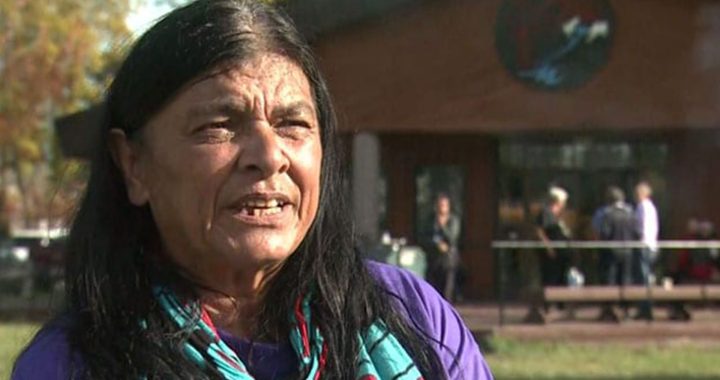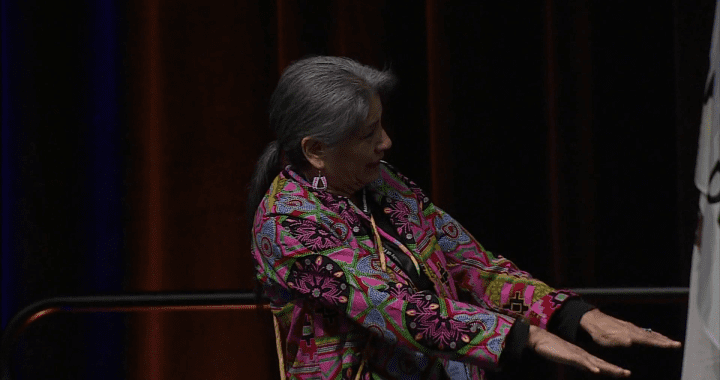
The mother with her eldest daughter in this undated photo. The child was just recently returned.
Three days after telling a mother she wouldn’t get her child back until at least Christmas, a child welfare agency in northwestern Ontario abruptly closed her customary care file telling a judge it had no longer had any protection concerns.
That judge returned the child to the mother on Oct. 23.
One of the reasons is the legal agreement keeping the child in care had expired approximately two years ago.
But a supervisor – with Weechi-ti-te-win Family Services in Fort Frances, Ont. – never told the mother that.
In fact, Jackie Lizotte told the mother there was a customary care agreement in place five different times during a telephone call on Oct. 20.
“There’s no customary care agreement, am I right?” says the mother during the call that was recorded and given to APTN News.
“No, there is a customary care agreement,” says Lizotte, supervisor of Weechi’s Couchiching First Nation child welfare team.
“Can you send me a copy of it? Like a recent one, from the past year?” says the mom.
Lizotte didn’t respond to that question and instead kept trying to move the conversation back to how she wanted to restart weekend overnight visits up until Christmas when the child would be returned to the mother.
“We all want what’s best for (the child), says Lizotte.
“What’s best for (my child) is to be with her mother,” says the mom.
Lizotte says she’s just worried about the child’s emotional state who has been with the caregiver, who is family, since four months old and had just started school.
“You are so focused on the emotional state of her but you guys rip out kids younger than her from their homes and you stick them in places where they have no idea where they are and that’s absolutely ok,” says the mother at one point.
Later in the call the mother tells Lizotte, again, she doesn’t think there’s an agreement, which angers Lizotte.
“There is a customary care agreement,” Lizotte shouts back.
“Then may I see it?
“I will talk to my lawyer and see what he says. What do you want it for? To give to your lawyer,” says Lizotte.
“I just want proof there is a customary care agreement stating my daughter is supposed to be in care right now.”
“I don’t know who’s told you that. I don’t know if I can release it. If I can…” Lizotte says but is cut off by the mother.
“It’s my right to see that.”

But this entire time the mother had another fight – the longtime caregiver, and a member of her family, was suing for custody of the child.
Then on Oct. 22 Weechi’s executive director, Laurie Rose, wrote the mother saying they were releasing her child.
“Your ongoing commitment to reunification has lowered the risk substantially. You have also completed all requirements of your service plan,” wrote Rose.
But the caregiver still refused, so the mother tried to get Treaty 3 police involved.
In fact, while the mother was frantically trying to get police to act, the caregiver’s lawyer filed for an emergency order to keep the child with his client until the court could hear arguments over the custody battle.
The judge refused to grant the order. In his written decision on Oct. 23, he said the caregiver had no legal authority to keep the child and ordered the child be returned to her mother.
The court also confirmed the customary care agreement had expired in 2018.
The mother said she was able to get her youngest daughter back over a year ago but it never made sense, if she was deemed fit to care for one child, that she wasn’t fit to have both her children.
“I couldn’t understand why I was getting so much resistance form the agency after all the work I had done to better myself as a parent,” said the mother.
“I could feel in my heart and gut that something wasn’t right.”
Related: Helping Daniel: A caregiver’s two-year journey to heal her broken ‘son’
In January, she was began overnight visits on the weekend but they stopped when the COVID-19 global pandemic hit.
And when they didn’t start again this fall she began pressing for answers. On Oct. 16, she wrote a letter to Weechi demanding her child back within five days, known as the five-day rule in Ontario. It puts the agency on notice: either return the child or go to court and prove child protection concerns.
Now the mom has to focus on keeping her daughter as the custody battle looms.
She told Lizotte, during the Oct. 20 call, she is ready for any fight.
“We’ll handle every road block that’s put before us. No problem. Because you know what? After dealing with you guys for the last two years I am pretty sure at this point we can do anything,” said the mom.
“Alright,” says Lizotte.
Lizotte didn’t respond to multiple emails or a telephone voicemail.
- This story was edited by Mark Blackburn and Paul Barnsley.










